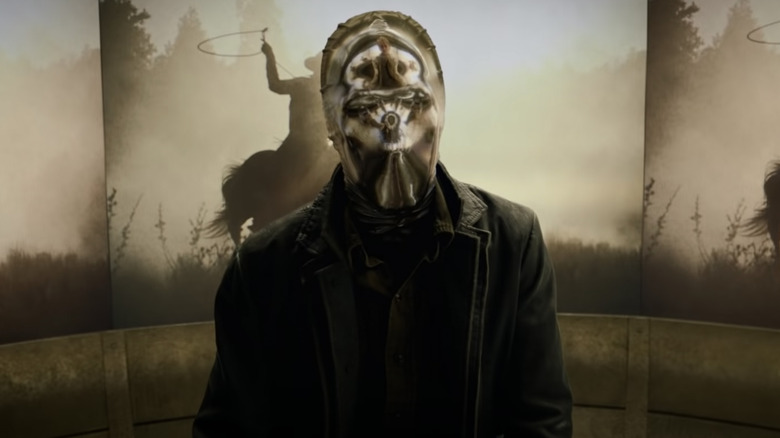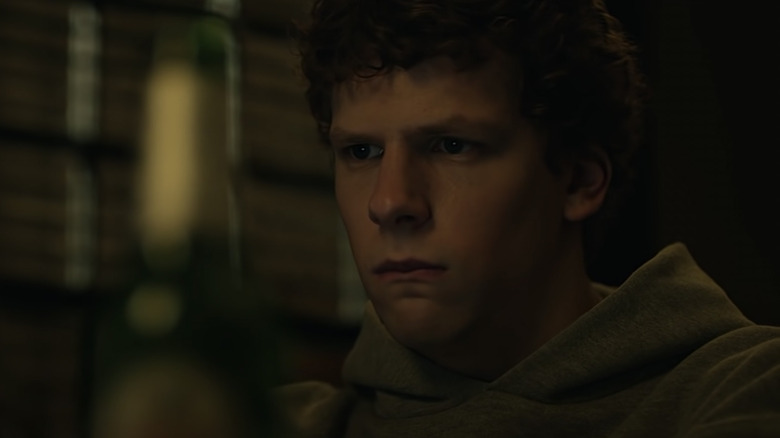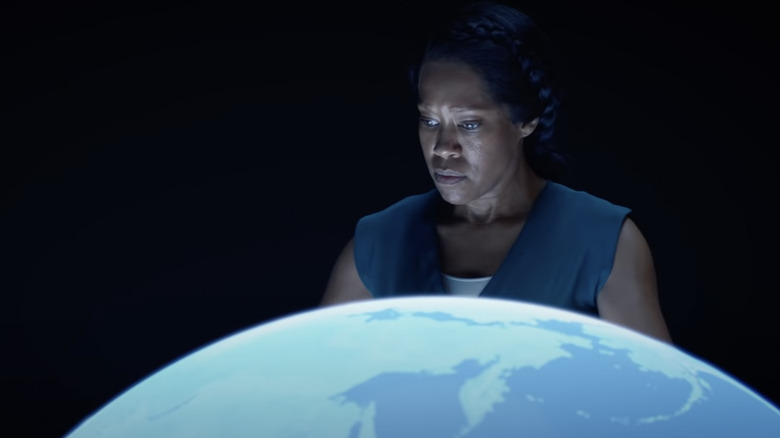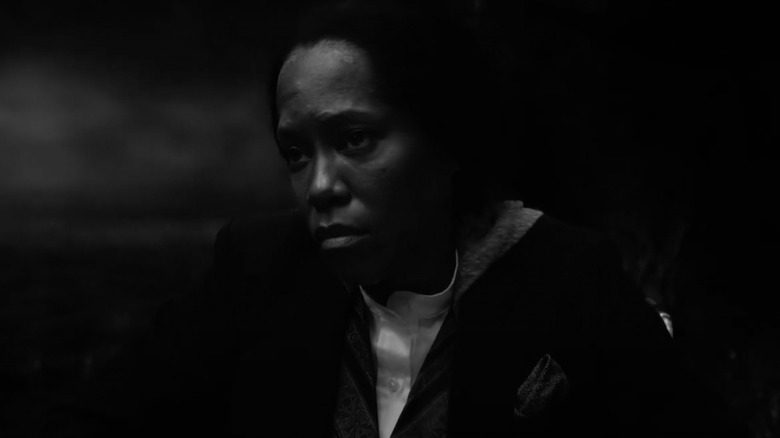Trent Reznor Didn't Need Any Convincing To Write The Score For HBO's Watchmen
Trent Reznor gained fame as the frontman of the industrial rock band Nine Inch Nails after writing, composing, performing, and producing the band's debut album "Pretty Hate Machine" in 1989. The album sold three million copies in the United States, and, along with '94s "The Downward Spiral," is widely regarded as one of the band's best. Since then, NIN has released 17 albums and was inducted into the Rock and Roll Hall of Fame in 2020. While Reznor's name and talents are sometimes solely linked to his successful band, his talents have reached far beyond the world of rock music.
Back in 1994, Reznor produced the soundtrack for Oliver Stone's "Natural Born Killers," which included a NIN original song, "Burn." In '97, the musician teamed up with fellow musician Peter Christopherson to compose two original themes for David Lynch's "Lost Highway." Again, NIN appears on the soundtrack with an original song, "The Perfect Drug." Reznor was a musical consultant for Denzel Washington's film "Man on Fire" in 2004, and he composed the theme for "Tetsuo: The Bullet Man" in 2009, but his breakthrough moment in film scoring didn't come until the following year.
In 2010, Reznor was given the chance to compose music for an entire film. He teamed up with fellow NIN member Atticus Ross and the duo composed scores for David Fincher's critically acclaimed film "The Social Network." Since then, the pair have created music for numerous critically acclaimed films, and have earned two Academy Awards for their scores.
And recently, Reznor and Ross composed music for HBO's "Watchmen," a 2019 series based on one of their favorite comics.
Songs vs. scores
Before 2010, Reznor hadn't scored an entire film, so the musician had to alter his approach to songwriting to do it successfully. In a featurette from "The Social Network" Blu-ray, he explains his typical thoughts about songwriting:
"Everything I've written up to this project has been assuming that I'm making something for your ears to pay attention to and your brain to fill in from there. I'm not supporting something else necessarily. I'm not trying to be supportive of a picture or dialogue or anything else. I'm hoping that when you're listening to music that's what you're doing you're listening to my music."
Reznor also explained how the role of music changes when it acts as the score of a film like "The Social Network":
"Now, thinking in terms of this film, there's a lot of talking, and you needed to pay attention to what was being said, and there's not a lot of space where there's not talking. There's not a lot of landscape scenes where the music can come up to the forefront while you're just watching something pretty or scary. You're paying attention to these characters, which are engaged in verbal jousting, and lots of information coming your way. So, let's get out of the way, but provide enough that it doesn't get boring with people just in a room talking about stuff."
Reznor is describing the delicate balance a score must have to be successful. A scene's accompanying music has to aid the conflict, drama, or tension of the moment without overwhelming it, which is the art of film composing. Most people wouldn't recruit an industrial rock band's frontman to achieve such balance, but Fincher did, and Reznor and Ross took home an Oscar for their work.
Watchmen
Since their work on "The Social Network," Reznor and Ross have scored "The Girl with the Dragon Tattoo," "Gone Girl," "Mank," and "Soul," which earned them their second Academy Award. The scores the two create are unique blends of tenderness and despair that clash with anger and destruction.
Like other composers, Reznor and Ross have the ability to balance their scores with film scenes, but there is something different and new about their scores that sets them apart from their predecessors. Their compositions can act as an aid to the world of a film, as traditional scores are meant to, but their scores are also worlds in themselves. Within the music lies an honest heaviness and unapologetic despair that isn't often heard in film scores.
Damon Lindelof, showrunner of HBO's "Watchmen" told Entertainment Weekly that he wanted that unique sound for the series, and the feeling was mutual:
"At the top of my wish list were Trent and Atticus. I called HBO and said, "Look, they haven't done TV but it's worth an inquiry." And [HBO drama executive] Francesca Orsi said, "This is the weirdest thing but their reps called us this morning and asked about Watchmen." Within 48 hours of that call, Trent and Atticus and I were in a room together and it turns out they're huge Watchmen fans. They signed up on faith and faith alone. They get the scripts at the same time the actors do. They started writing the music even before we shot the pilot so we can get a sense in our heads of what it would sound like."
Again, Reznor and Ross had to alter their thought process, because they were creating sounds for something that didn't exist. All they had was a script and a vague description of possible future events, which the pair didn't find to be inspiring.
'The Way It Used to Be'
In an interview with DP/30, Rezner explained how he struggled to understand music's purpose in the show:
""Watchmen" was a blank slate, and what we found difficult particularly about it, was that at first we didn't have the whole thing. We started with the pilot and maybe the second episode and a description that was hard to follow of what might happen through the season, but not a clear path forward ... It wasn't until we saw a first cut that we could understand what the role of music was going to be, and, therefore, the sound."
The music in "Watchmen" is different from the other scores Reznor and Ross have created because it is an episodic show with varying emotions and time periods. Some scenes take place in the present day and others take place in the '40s, which affects the sounds the pair had to create. There are scenes that take place over the deep bass and gritty tension that the musical duo are known for, but there are also ethereal piano notes, and even a big band moment.
"The Way It Used to Be" is a haunting song layered with saxophones and an angelic voice reminiscent of jazz singers in the mid '30s and '40s. The sound of the song is different from any other score that Reznor and Ross have produced, but the familiar NIN themes of despair, regret, and tenderness remain woven through the big band sound. The tune plays over the brutal lynching of a police chief with a secret past and produces an evocative eeriness that sends shivers up the spine.
Reznor and Ross' have proven they're more than a couple of guys from a rock band. They are talented musicians who write unique and poignant scores that will fill countless scenes for years to come.



